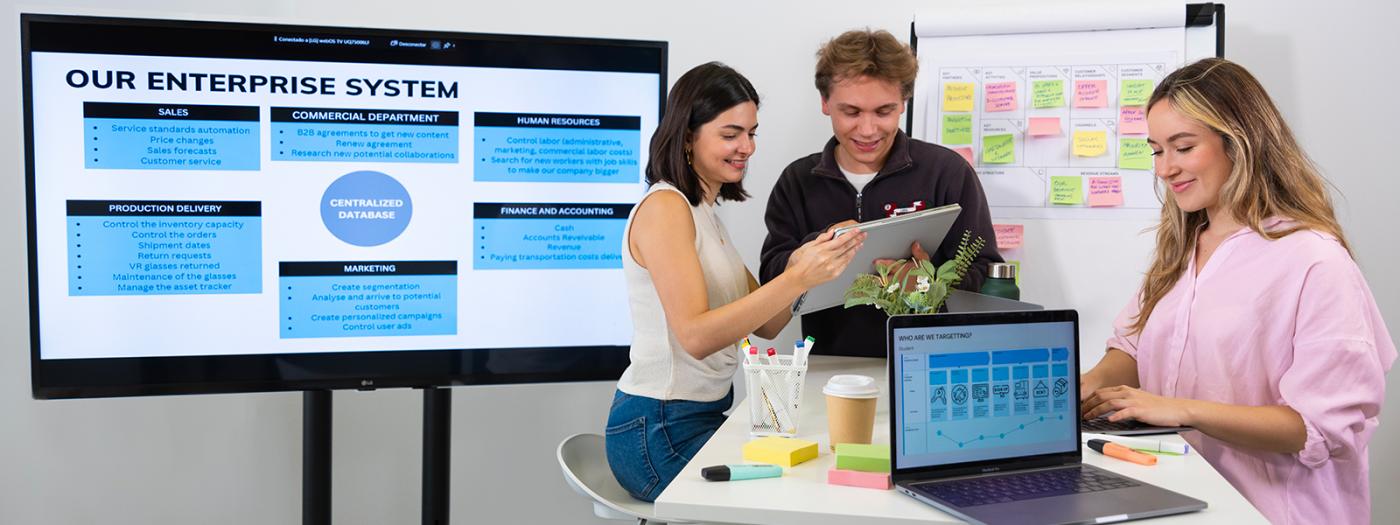Management, as we know it today, has been the subject of study and practice roughly for the last 100 years. Some people think that a good manager can manage anything, regardless of its technological base. But there is strong evidence that the ability to evaluate alternative technologies and their investment requirements, the capacity to envision how scientific and technical knowledge find their way to the market, and the knowledge about how to manage complex innovation and production processes, all require a distinctive set of skills.
In this course, we will look at what these skills are. Many cases will be studied, of both successful and failed technology-based projects and enterprises. By the end of the course students are expected to have developed their own criteria about how to manage R+D or Innovation Projects, always in a business context.
Titular Professors
By the end of the course, students should be able to:
- Understand the structure of the High-Tech sector.
- Evaluate R+D and innovation projects and understand their different management options.
- Understand how an innovation process works.
- Understand how project teams fit into a particular organization.
- Propose specific organizations to manage technology enterprises.
- Understand how Intellectual Property (IP) works
- Make an informed opinion about new products commercialization options.
- Identify innovation risks in specific situations.
This course seeks to assist you in:
- Understanding the role of R+D+I in the Knowledge Economy.
- Managing Research and Development and Innovation as a Business Process.
- Managing in Large Organizations vs. managing in Small Organizations.
- Reviewing all the Sources of Innovation (in addition to R+D).
- How to take decisions regarding Innovation projects (accepting or rejecting projects).
- Distinguishing between Idea Generation vs. Idea Application.
- Understanding the role of Open Innovation.
- Understanding the Technology Diffusion processes. The Three Horizons model.
- Learning about Technology Readiness.
- Organizing R+D+I teams, and their relationship with the companys organization.
- Understanding the basic Intellectual Property concepts.
- Understanding National and Regional Innovation Systems.
- Understanding how Technology Transfer takes place in the Digital Economy.
The course is divided in the study of 11 different topics, each covering a different viewpoint of how Technology Intense Organizations may be managed. For each topic, a combination of the following will be used:
- Lectures - There will be 11 lectures, from October to December. At each lecture a topic will be introduced.
- Weekly Assignments - Assignments will be given BEFORE each topic is presented. Therefore, students are not expected to provide a right or wrong answer for each assignment, but are expected to think about the main issues of each topic.
- Class discussions - Many cases will be discussed through the course. Maximum benefit for the student will be obtained only if each case has been prepared by previously doing the corresponding weekly assignment.
- Readings - A list of recommended books and papers will be provided. In addition, other sources may be referred during the course.
- Videos - When available, relevant videos will also be viewed, as additional materials for the class discussions.
The Course grade will be based on the following point breakdown:
- 50%: Attendance (10%), weekly assignments (20%), class activities and quizzes (20%).
- 25%: Midterm Exam
- 25%: Final Exam
For those students deciding to go for a retake exam, the final course grade will be computed as follows:
- 50%: Attendance, weekly assignments, class activities and quizzes, as computed during the course.
- 50%: Retake Exam
RECOMMENDED TEXTS
- Schilling, M.A., Strategic Management of Technological Innovation, 5th edition, Mc-Graw-Hill, 2017
- Tidd, J., and Bessant, J. Managing Innovation: Integrating Technological, Market and Organizational Change, 7th Ed. Wiley 2020
SPECIFIC INNOVATION AND NEW TECHNOLOGY ADOPTION REFERENCES
- Moore, G.A., Inside The Tornado, Capstone Publishing Ltd., 2001
- Christensen, C.M., The Innovator's Dilema, Harvard Business School Press, 1997
- Christensen, C.M, Raynor, M.E., The Innovator's Solution, Harvard Business School Publishing Corporation, 2003
- Geroski, P., The Evolution of New Markets, Oxford University Press, 2003
- Chesbrough, H.W., Open Innovation: The new imperative for creating and profiting from technology, Harvard Business School Press, 2003
INNOVATION EXAMPLES
- Lynn, G.S., Reilly, R.R., Blockbusters, Harper Collins, 2002
- Battelle, J., The Search, Penguin Group, 2006
- Smith, D.K., Alexander, R.C., Fumbling the Future, William Morrow & Co. 1988
OTHER REFERENCES
- Surowiecki, J., The Wisdom of Crowds, Random House, 2004
